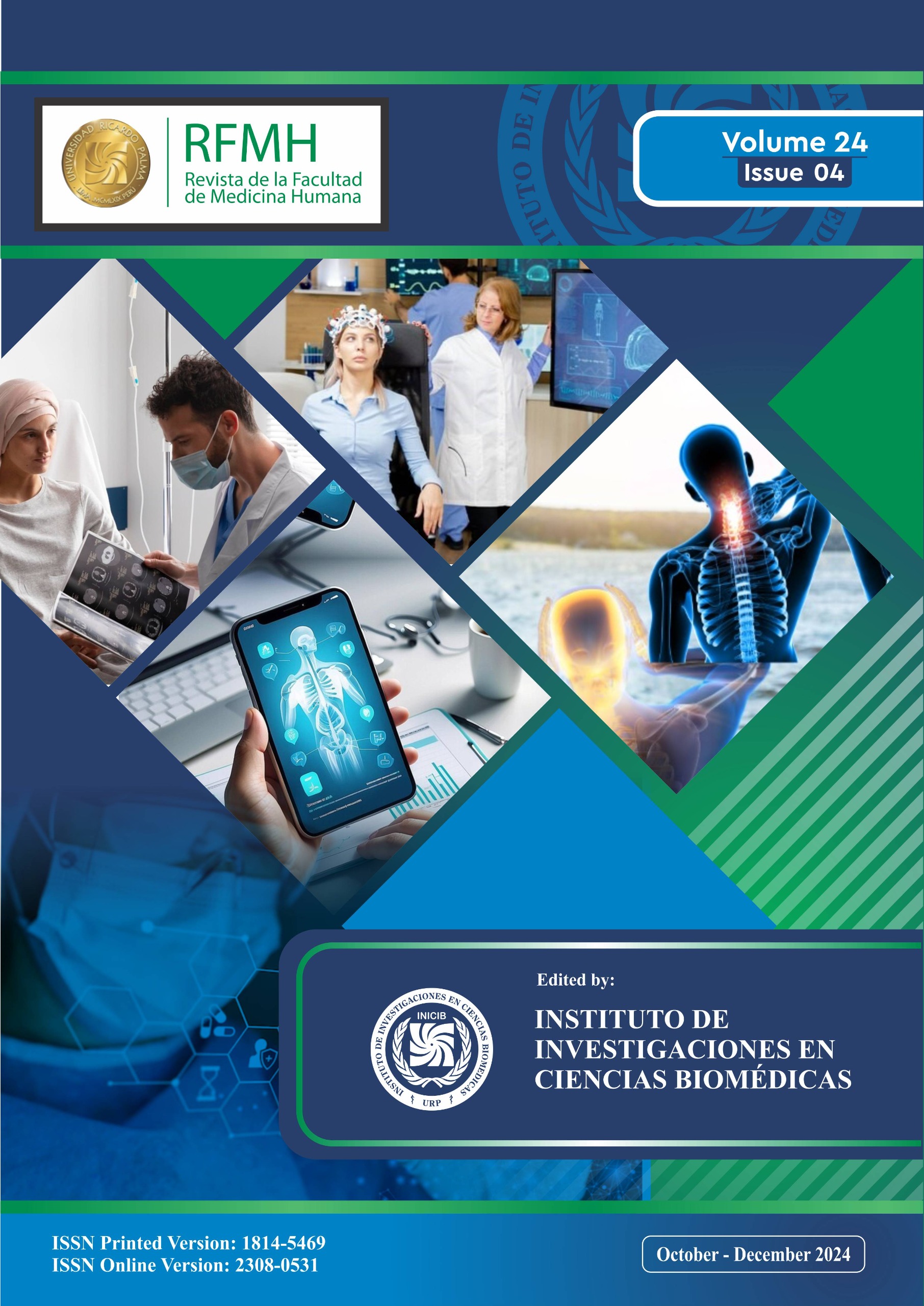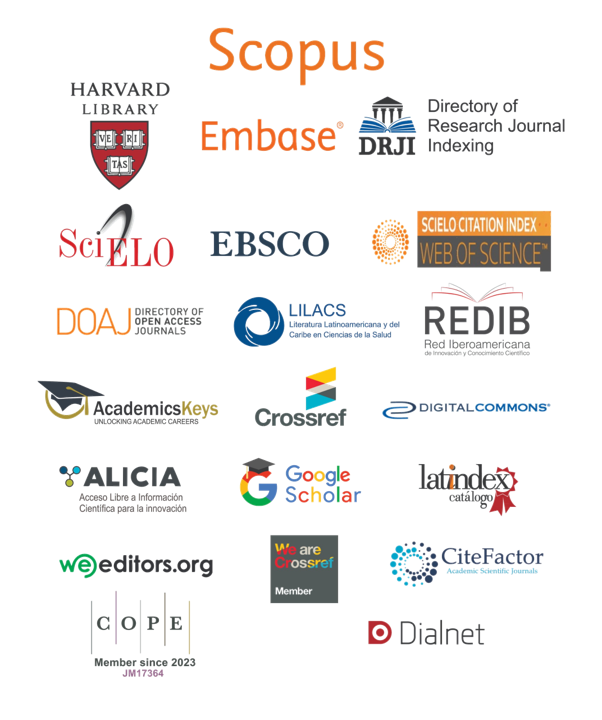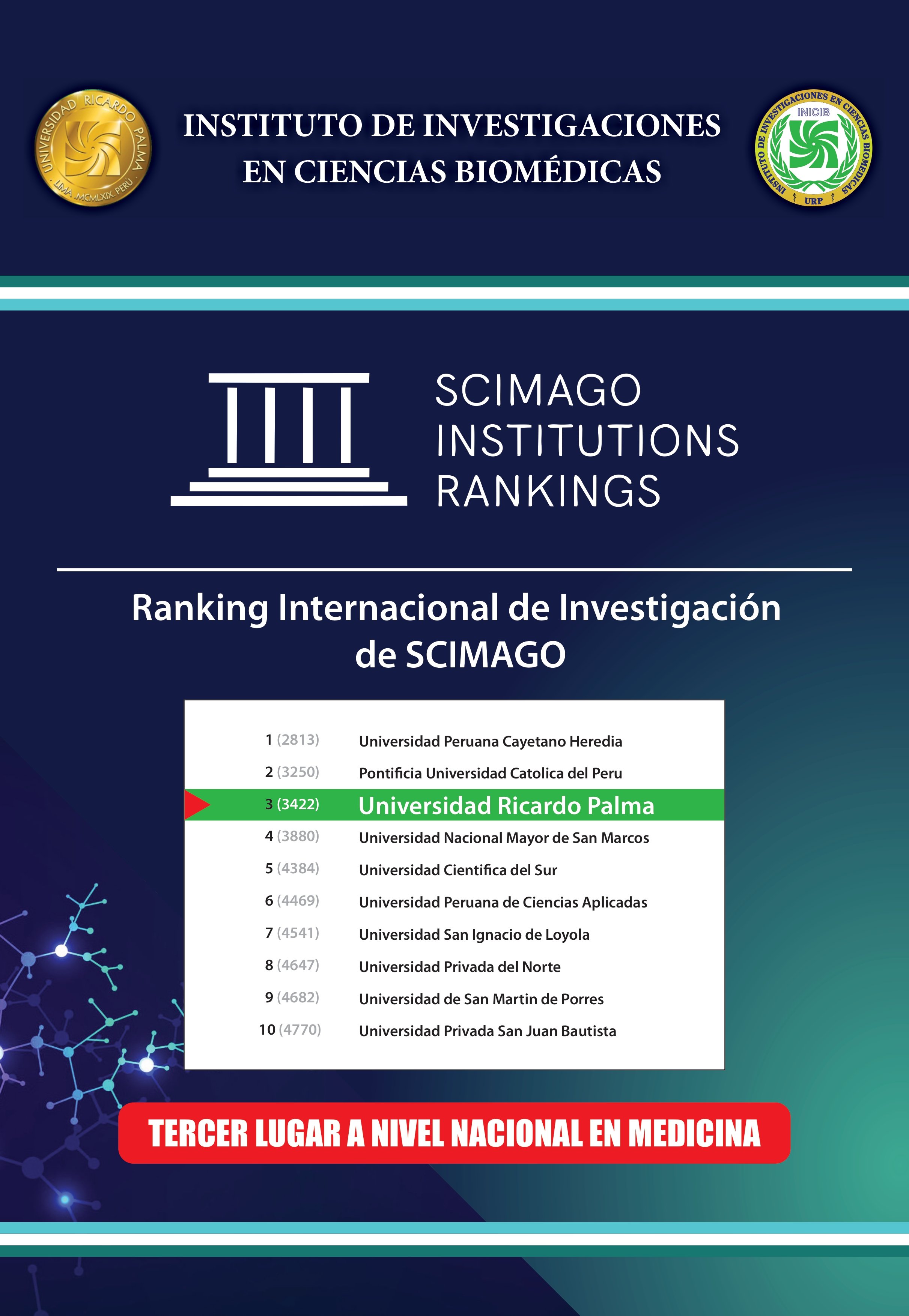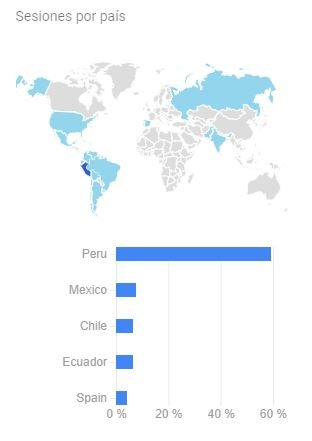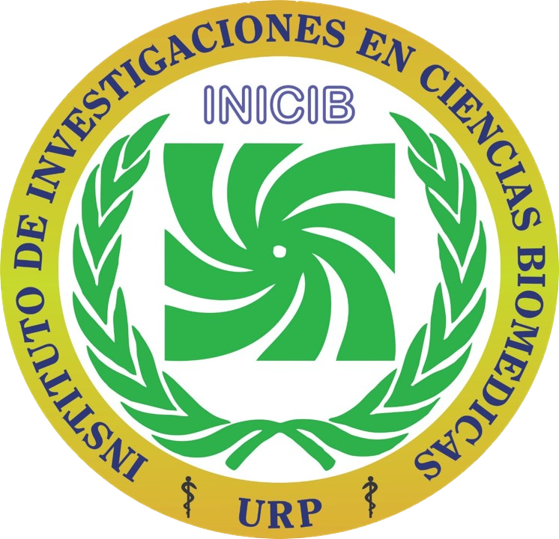Publication Ethics and Malpractice Statement (PEMS)
The Revista de la Facultad de Medicina Humana of Universidad Ricardo Palma and its publisher, the Instituto de Investigaciones en Ciencias Biomédicas of Universidad Ricardo Palma, adhere to the recommendations provided by the Committee on Publication Ethics (COPE), by following their basic practices (Core practices)(https://publicationethics.org/core-practices).On the other hand, this journal also follows the recommendations for the realization, preparation of reports, edition and publication of academic works in medical journals provided by the International Committee of Medical Journal Editors (ICMJE) (http://www.icmje.org/recommendations/), authors, reviewers and editors are expected to follow the guidelines on ethical behavior contained in them.
A selection of key points about the guidelines previously presented is included below, however, it is needed to consult them directly for full details.
- DUTIES OF THE EDITOR
- DUTIES OF THE REVIEWERS
- DUTIES OF THE AUTHORS
- DUTIES OF THE PUBLISHER
- PROCESS FOR IDENTIFICATION OF AND DEALING WITH ALLEGATIONS OF RESEARCH MISCONDUCT
- COMPLAINTS AND APPEALS POLICY
- ETHICAL OVERSIGHT POLICY
- INTELLECTUAL PROPERTY POLICY
- DATA SHARING AND REPRODUCIBILITY POLICY
Duties of the editor
Editors of the journal have the responsibility to decide which manuscripts sent to the journal will be published; they also guarantee that this decision is based exclusively on the quality of the manuscript and does not take into account religion, race, ethnicity, nationality, gender, sexual orientation or political convictions of the authors.
Confidentiality
Information about a manuscript will be shared only with the correspondent author, reviewers assigned to that manuscript, and publisher committee members in charge of that manuscript.
Disclosure and conflicts of interest for the editor
Editors and members of the publisher team will not use the unpublished information of manuscripts sent to the journal for their own scientific or research purposes without the explicit written consent of the authors. Any insider information or ideas obtained by the editors resulting from the handling of the manuscript will be kept in the strictest confidentiality and will not be used for their personal benefit. Editors and members of the publisher team will abstain and exempt themselves from handling manuscripts in which they have conflicts of interest of any kind, including competitive, collaborative or other relationships with any of the authors, companies or institutions related to the manuscript in question; instead, they will ask another publisher to handle the manuscript.
Publication decisions
Editors and publisher team members ensure that all submitted manuscripts being considered for publication are peer-reviewed, that is, reviewed by at least two expert reviewers in the field. The editor-in-chief is responsible for deciding which of the manuscripts sent to the journal will be published, based on the validity of the work in question, its relevance to researchers and readers, reviewers' comments and current legal requirements on defamation, copyright infringement and plagiarism. The editor-in-chief may consult with other editors or reviewers to make this decision.
Participation and cooperation in research
Editors (in conjunction with the publisher) will take appropriate measures when ethical concerns arise regarding a submitted manuscript or published article. Each allegation of unethical publishing behavior or scientific misconduct will be examined, even if it is discovered years after publication. The editors of the Revista de la Facultad de Medicina Humana follow COPE flow diagrams when dealing with suspected cases of scientific misconduct. If, as a result of the investigation, ethical questioning is well founded, a correction, retraction, expression of concern or another relevant note will be published in the journal. If required, retractions or corrections will be made following the COPE guidelines on retraction of articles (https://publicationethics.org/retraction-guidelines) or corrections (https://publicationethics.org/postpublication).
Duties of the reviewers
The Revista de la Facultad de Medicina Humana uses the peer review system under the double-blind modality to guarantee the quality of the articles it publishes. This process will be carried out by prestigious specialists from national and international institutions, who are selected according to their experience in the respective subject, based mainly on publication indicators.
Purpose of the peer review
Peer review helps publishers make publisher decisions and, through editor-mediated communications with authors, can help authors improve their manuscripts. Peer review is an essential component of formal academic communication and is at the heart of scientific endeavor.
Promptness
Any potential reviewer who does not feel qualified to perform a proper arbitration or who knows that it will be impossible for him to perform a prompt and timely review, must immediately notify the editors and reject the invitation to contact other potential reviewers.
Confidentiality
All manuscripts received by reviewers are confidential documents and should be treated as such; they should not be displayed or discussed with others, unless authorized by the editor-in-chief (who would only do so in exceptional and specific circumstances). This also applies to reviewers who reject the invitation to review.
Objectivity
Revisions should be made objectively and observations should be clear and supported by arguments, so as to allow authors to improve their manuscript. Personal criticism of authors is inappropriate.
Acknowledgement of sources
Reviewers should identify relevant published studies that have not been cited in the manuscript under review. Any statement that is an observation, derivation or argument that has been reported in previous publications must be accompanied by the correspondent citation. A reviewer must also notify editors of any substantial similarity or overlap between the manuscript under consideration and any other manuscript (published or unpublished) of which he is personally aware.
Disclosure and conflicts of interest for reviewers
Any guest reviewer who has conflicts of interest of any kind, including competitive, collaborative or other relationships with any of the authors, companies or institutions related to the manuscript under review; must immediately declare to editors their conflicts of interest and reject the invitation to be a reviewer, so that alternative reviewers can be contacted.
Unpublished material disclosed in a submitted manuscript should not be used in a reviewer’s own research without the explicit written consent of the authors. Inside information or ideas obtained through peer review should be kept confidential and should not be used for the personal benefit of the reviewer. This also applies to reviewers who reject the invitation to review.
Duties of the authors
The Revista de la Facultad de Medicina Humana does not charge authors for the submission of articles, evaluation process or publication of articles.
Reporting standards
Authors of an original research should present an accurate report of the work done and its results, followed by an objective discussion on the importance of the work, Also, the manuscript must contain sufficient details and references that allow the replicability of the work. With respect to review articles, these should be precise, objective and complete, while publisher "opinion" or perspective articles should be clearly identified as such. Fraudulent or deliberately inaccurate statements constitute unethical behavior and are not acceptable.
Data access and retention
Authors may be asked to provide the raw data (i.e., untreated for analysis) of their study along with the manuscript for publisher review and should be ready and willing to make the data publicly available if possible. In any case, authors should ensure the accessibility of such data to other competent professionals for at least 10 years after publication (preferably through an institutional, thematic or other data center data repository), provided that the confidentiality of subjects can be protected and the legal rights of ownership of data do not prevent their disclosure.
Confidentiality
Authors are responsible for following the protocols established by their respective health centers or institutions for access to data from medical records or other documents containing personal information, when these are required for research. They must declare compliance with this requirement.
Privacy
Author is responsible for guaranteeing the right to privacy of the participants, protecting their identity. He must not use names, initials, medical history numbers or any other data irrelevant to the research that could identify the patient either in the text or in the photographs or elsewhere in the manuscript; unless such information is essential for scientific purposes.
If there is information essential to the scientific objectives that may compromise the identity of the participant, the informed consent for such publication by the participant or, if applicable, his or her parent or legal guardian must be collected. The authors are responsible for obtaining this informed written consent, authorizing its publication, reproduction and dissemination in print and digital form of the journal and presenting it to the publishers.
Originality and plagiarism
Authors should ensure that they have written and submitted only entirely original works and, if they have used the work and/or words of others, that this has been properly quoted. Publications that have influenced the determination of the nature of the work reported should also be cited. Plagiarism takes many forms, from "passing off" another’s article as one’s own, to copying or paraphrasing substantial parts of another’s article (without the respective credit), to claiming results of research done by others. Plagiarism in all its forms constitutes unethical publication behavior and is strictly rejected. The Revista de la Facultad de Medicina Humana uses plagiarism detection software to evaluate all manuscripts submitted.
Permit obtainment
Authors are responsible for obtaining permission to partially reproduce material (text, tables or figures) from other publications. These permits must be requested from both the author and the Publisher that has posted such material. On the other hand, permission for publication by the institution that funded the research is also required.
It must be declared if the content of the article is original and if it has not been previously published or sent or submitted for consideration to any other journal, in its entirety or in any of its parts. Authors should be aware that not disclosing that the material submitted for publication has already been published, in whole or in part; it constitutes a serious breach of good practice in research.
Multiple, duplicate, redundant, or concurrent submission or publication
Articles describing essentially the same research should not be published in more than one primary journal or publication. Therefore, authors should not submit for consideration a manuscript that has already been published in another journal. Sending a manuscript simultaneously to more than one journal is an unethical and unacceptable publication behavior. The publisher committee investigates possible situations of scientific misconduct, such as the analysis of articles submitted using plagiarism detection software, systematic search of previous publications to avoid redundant publication or other required publications.
The publication of some types of articles (such as clinical guidelines or translations) in more than one journal is justifiable in very specific situations and provided certain conditions are met. Authors and publishers must agree with the secondary publication, and it must reflect the same data and interpretation of the main publication. The main reference should always be cited in the secondary publication.
Authorship of the manuscript
Only persons who meet these authorship criteria should be listed as authors in the manuscript, as they should be able to assume public responsibility for the content: (i) they made significant contributions to the conception, design, execution, data acquisition or analysis/interpretation of the study; and (ii) wrote the manuscript or critically reviewed it for important intellectual content; and (iii) have seen and approved the final version of the document and have accepted its submission for publication; and (iv) be responsible for all the content poured into the publication. All persons who made substantial contributions to the work reported in the manuscript (such as technical assistance, publisher assistance, general support) but who do not meet the authorship criteria should not be listed as authors, but whether they should be recognized in the "Acknowledgments" section after giving their written permission to appear in that section. The correspondent author must ensure that all and only valid co-authors (according to the above definition) are included in the list of authors and verify that all co-authors have seen and approved the final version of the manuscript and agree to its submission for publication.
The list of authors should include only those persons who have contributed intellectually to the development of the work. Having helped in the collection of data or having participated in some technique are not in themselves sufficient criteria to appear as an author. In general, the following requirements (all four) must be met in order to be an author:
- Have made substantial contributions in the design or design of the study; or in the acquisition, analysis or interpretation of the data of the work that has resulted in the article in question.
- Have participated in the drafting of the manuscript or in critical reviews with important intellectual content of the manuscript.
- Have approved the version which is finally to be published.
- Accept responsibility for all aspects of the study and ensure that any questions relating to the accuracy or integrity of any part of the study can be properly investigated and resolved.
CRediT taxonomy (https://onlinelibrary.wiley.com/doi/epdf/10.1087/20150211) will be considered for authors' individual contributions to the article: conceptualization, data curation, formal analysis, fundraising, research, methodology, project management, resources, software, supervision, validation, writing-preparation of the original manuscript, writing-revision of the original manuscript.
The Revista de la Facultad de Medicina Humana declines any responsibility on possible conflicts arising from the authorship of the works that are published in the journal.
Declaration of conflicts of interest for authors
Authors should, at the earliest possible stage (usually by submitting a conflict of interest declaration form at the time of submission of their manuscript and including a statement in the manuscript) declare any conflict of interest that may be construed to influence the outcome of the work or its interpretation. Examples of potential conflicts of interest to be reported include financial ones such as fees, educational scholarships or other funding, participation in lectures or conferences, membership, employment, consultancies, ownership of shares or other shareholding, paid expert testimony or patent license agreements; as well as non-financial ones such as personal or professional relationships, affiliations, knowledge or beliefs in the subject or materials discussed in the manuscript. All sources of financial support for work should be disclosed (including grant number or other reference number, if applicable).
Acknowledgement of sources
Authors should ensure that they have properly recognized the work of others and should also cite publications that have influenced the determination of the nature of the reported work. Information obtained privately (from conversations, correspondence or discussions with third parties) should not be used or communicated without the explicit and written permission of the source. Authors should not use information obtained in the course of providing confidential services, such as arbitration of manuscripts or grant applications, unless they have obtained explicit written permission from the authors of the work involved in these services.
Hazards to human or animal subjects (protection of persons and animals)
If the work involves chemicals, procedures or equipment that have risks inherent to their use, authors should clearly identify them in the manuscript. If the work involves the use of animal or human participants, the authors must ensure that all the procedures have been carried out in accordance with the relevant institutional laws and guidelines and that the correspondent institutional committees have approved them; the manuscript must contain a declaration to that effect. Authors should also include a statement in the manuscript that informed consent was obtained for experimentation with human participants. The privacy rights of human participants must always be respected. The procedures in these cases must be in accordance with the World Medical Association Declaration of Helsinki (https://www.wma.net/policies-post/wma-declaration-of-helsinki-ethical-principles-for-medical-research-involving-human-subjects).
Peer review
Authors are obliged to participate in the peer review process and to cooperate fully by promptly responding to editors on the request for raw data, clarifications and evidence of ethical approval, patient consents and copyright permissions. In the case of a first decision of "necessary reviews" or "conditional acceptance", the authors must respond to the reviewers' comments in a systematic, point-by-point and timely manner, reviewing and forwarding your manuscript to the journal within the established time frame.
Important errors in published works
When authors discover important errors or inaccuracies in their own published work, it is their obligation to immediately notify the journal editors or the editor and cooperate with them to correct the article in the form of an erratum or retract it. If the editors or editor learn of a third party that a published work contains a significant error or inaccuracy, then it is the authors' obligation to correct or retract the article immediately or provide evidence to the editors of the journal about the correctness of the article.
Informed consent and assent
In all cases that require it, the use of informed consent should be detailed and based on the study. In the case of publication of photographs or data of participants, they should not be identified, and the authors should have obtained the informed written consent of the patient who authorizes their publication, reproduction and dissemination in print and digital form of the journal and must be submitted to the publishers. For the publication of case reports, it is necessary for the authors to request the institutional permits for the publication of the report and to declare whether they had the informed consent provided by the patient or, if the case, by their parent or legal person.
Financing
Authors must declare the provenance of any financial aid received or funding for the study. Authors should include the code or award number of funding wherever possible.
Duties of the publisher
As publisher of the Revista de la Facultad de Medicina Humana, the duties of Instituto de Investigaciones en Ciencias Biomédicas of Universidad Ricardo Palma are:
Management of scientific misconduct and questionable research practices
In cases of alleged or proven scientific lack, fraudulent publication or plagiarism; the publisher, in close collaboration with the editor-in-chief of the journal, will take all appropriate measures to clarify the situation and modify the article in question. This includes the prompt publication of an errata, clarifications or, in the most serious case, the retraction of the affected work. The publisher, together with the editor-in-chief of the journal, shall take reasonable steps to identify and prevent the publication of articles in which scientific misconduct has occurred, and under no circumstances will it encourage such misconduct or knowingly allow it to take place.
Access to the contents of the journal
The publisher is committed to the permanent availability and preservation of the academic research published in the journal and guarantees its accessibility by associating with organizations and maintaining its own digital archive.
Support for the editor-in-chief and journal team
The publisher is committed to providing practical support to the editor-in-chief and publisher team of the journal. It also ensures the autonomy of publisher decisions and ensures that good practices are maintained in accordance with the standards defined above.
Process for identification of and dealing with allegations of research misconduct
To uphold the integrity of academic and scientific research, the Revista de la Facultad de Medicina Humana has established a robust process for the identification and resolution of allegations of research misconduct. When an allegation of misconduct—such as falsification, fabrication of data, plagiarism, or other unethical research practices—is reported, it triggers a preliminary assessment to determine the validity of the claim. This assessment is confidential and aims to protect all parties involved. If the preliminary findings suggest potential misconduct, a formal investigation is convened. This investigation is thorough, fair, and adheres to predefined procedural safeguards to ensure unbiased results. The outcomes of the investigation may lead to corrections, retractions, or other forms of publication amendments depending on the findings. Throughout the process, the journal adheres to the guidelines established by COPE, ensuring that all actions are aligned with international standards for handling allegations of research misconduct.
In addition, the Revista de la Facultad de Medicina Humana is full membership of COPE.
(https://publicationethics.org/members/revista-de-la-facultad-de-medicina-humana)
Complaints and Appeals policy
Complaints policy
The journal intends to respond and resolve all complaints quickly and constructively. According to the nature and complexity of the complaint, the case will be studied by the editorial team of Revista de la Facultad de Medicina Humana, and decisions will be made taking into account the recommendations issued by the Committee on Publication Ethics (COPE).
To submit a complaint of any editorial decision of this journal, you must write directly to the main contact e-mail of the previous mentioned. All communications shall be resolved within thirty (30) business days. Although depending on the level of complexity of the complaint, the complainant will be informed if more time is required to conclude the investigation of the case.
The complaint must be clear, specific and contain sufficient data to demonstrate a possible fault in the editorial process of the journal. As far as possible, additional documentation must be attached as proof or evidence of the concern.
Complaints that are outside the scope of the journal: such as personal complaints against authors, editors, evaluators or the editorial team of the journal, will receive a response indicating the reasons why the complaint is not considered valid. In addition, the journal will refrain from conducting investigations when complaints or claims are submitted in an offensive, threatening or defamatory manner.
Appeals policy
Editors have the faculty to determine in the first instance whether a journal submission is appropriate and, consequently, to reject the submission at this stage without an external review and with a very general statement of the rejection decision to the editors or authors. These decisions are not subject to formal appeal.
On the other hand, if an author considers that the decision to reject his manuscript did not agree with the journal policy or if the author disagrees with some of the corrective measures taken after publication, you can appeal the decision by sending a detailed and duly substantiated communication to the main contact of the journal.
The editor-in-chief, in conjunction with the editor in charge of the article in question, will review the editorial process of the article on appeal and respond to the author if:
- The decision made must be kept
- Another independent opinion is required
- The appeal should be considered
Complainant shall be informed of the decision with an explanation, if applicable. Decisions on appeals are final and new submissions have priority over previous appeals. Decisions will be made taking into account the recommendations made by the Committee on Publication Ethics (COPE).
Ethical Oversight Policy
The Revista de la Facultad de Medicina Humana de la Universidad Ricardo Palma, is committed to maintaining high ethical standards in all published research. Following the guidelines from the Committee on Publication Ethics (COPE) and the International Committee of Medical Journal Editors (ICMJE), our ethical oversight policy covers several essential aspects:
Consent for publication: All studies involving human beings or personal data must include explicit informed consent from participants, preserving their anonymity and privacy unless the disclosure of their identity is essential for the scientific purposes of the study.
Research involving vulnerable populations: When publishing research that involves vulnerable populations, special precautions must be taken to protect the rights and welfare of these groups, ensuring that the methods employed are ethical and fair.
Ethical conduct in research using animals: Any research involving animals must adhere to international ethical guidelines, ensuring that animal suffering is minimized and the necessity of their use is clearly justified.
Ethical conduct in research using human subjects: Studies must be reviewed and approved by institutional ethics committees and comply with relevant national and international regulations, including the Helsinki Declaration.
Handling of confidential data: Confidentiality and security of sensitive data are guaranteed by implementing appropriate data protection measures and complying with applicable data protection laws.
Ethical business and marketing practices: All commercial and marketing activities associated with publication are expected to be conducted ethically, avoiding any form of misleading advertising or undeclared conflicts of interest.
These principles are fundamental to ensuring the integrity and quality of the research published in our journal. Additionally, authors, reviewers, and editors are required to follow these guidelines to foster an environment of mutual respect and transparency in the editorial process. All contributors are urged to review the complete policies available through the provided links to ensure full understanding and compliance with our ethical expectations.
Intellectual Property Policy
The Revista de la Facultad de Medicina Humana establishes a rigorous policy regarding intellectual property rights, which is essential for research and academic publishing. According to this policy:
Authorship rights: Authors retain their trademark and patent rights, as well as control over any processes or procedures described in their articles. They also maintain the right to share, copy, distribute, perform, and publicly communicate their work, always acknowledging the initial publication in the journal. Furthermore, authors may make subsequent publications of their work, using the article or parts thereof in other academic contexts, correctly citing the original source.
Open access and licensing: The journal operates under an open access model, publishing articles under the Creative Commons BY 4.0 license, which allows broad dissemination and use of the content while preserving the intellectual property of the authors. Authors must agree with the terms of the license and understand its implications.
Prevention of plagiarism and unauthorized use: Submitted works are expected to be original and not infringe on third-party intellectual property rights. Plagiarism and unauthorized use of copyrighted materials within articles, such as images, figures, or tables, without necessary permissions, are strictly prohibited.
Attribution and citation: Authors must accurately cite and acknowledge the works of others that have been used in their research, providing proper attribution to all sources and references used in the article.
Management of intellectual property disputes: The journal handles any disputes or concerns related to intellectual property diligently and in accordance with COPE guidelines. In case of disputes, necessary evidence and documentation may be requested for resolution.
Authors are responsible for ensuring that their research and manuscripts comply with intellectual property laws and regulations. Any concerns or disputes should be reported to the editorial team of the journal for appropriate action.
Data Sharing and Reproducibility Policy
As part of our commitment to research integrity and reproducibility, we urge authors to share the data and materials that support the findings and analyses presented in their papers. It is crucial that this sharing is conducted ethically, respecting the protection of human subjects and other valid ethical, privacy, or security considerations.
Data depositing
Authors should deposit their data in a recognized repository that can assign a persistent digital identifier, such as a DOI. We recommend following the FAIR Data Principles (findable, accessible, interoperable, and reusable) and using platforms like FAIRsharing, re3data.org o others, to select an appropriate repository.
Data availability statement (DAS)
Authors are required to include a data availability statement in the manuscript, specifying where and how the associated data can be accessed. This statement should be placed before the ‘References’ section. If data cannot be made open, a clear justification must be provided in the statement.
Data citation
We support the Force 11 Joint Declaration of Data Citation Principles, which recognizes data as citable research products. Authors should cite all datasets used in the body of the article and properly reference them in the reference list.
Submission process
When submitting a manuscript, you are requested to provide the DOI or any other persistent identifier associated with the data. If opting for a pre-registered DOI, be prepared to share the reviewer URL associated with your data deposit upon request by reviewers.
Peer review
It is the author's responsibility to ensure the validity of the data presented. Peer reviewers and editors will assess the data availability statement and compliance with the journal's data sharing policy.
Support
For further assistance with this policy, please consult our data sharing FAQs or contact us at revista.medicina@urp.edu.pe.
Basic data sharing policy
By submitting your work to our journal, you agree to make your data available upon reasonable request, without violating the protection of human subjects or valid privacy concerns. Data must be publicly accessible, under the license of your choice, and comply with FAIR standards. Choosing open data maximizes the reuse and impact of your research.




